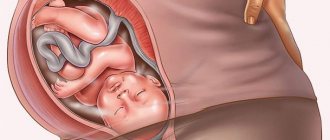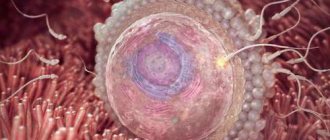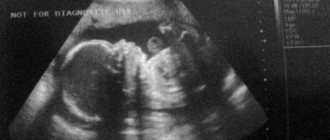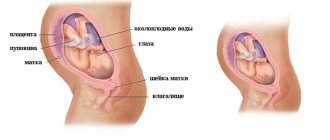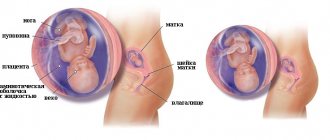The 6th obstetric week of pregnancy has begun, the 4th embryonic week (from conception). The baby has entered its second month of development in the womb. What awaits a woman this week:
- What sensations will appear and what should you be wary of?
- How does the embryo develop, which systems are already working, and which are just being formed?
- Do I need to do an ultrasound and tests, what will the gynecologist check at the appointment?
- Will the weight and appearance of the expectant mother change and what recommendations should be followed?
- Vitamins
- Approved medications
- Ectopic pregnancy
Baby development at 6 weeks of pregnancy
Along with the sixth week of pregnancy, the second embryonic period of the baby's intrauterine development begins. The development of the fetus occurs in waves, according to a certain chronology of events laid down by nature itself.
The baby’s body already contains the main organs and tissues - the bones of the axial skeleton, the rudiments of the kidneys and liver, the primary intestine and the thyroid gland. The structure of individual systems – the heart, neural tube, and brain – becomes more complex.
| Development parameters | Approximate indicators of the norm (at this time) |
| Embryo weight | less than 1 g |
| Height (coccyx - parietal size) | ~ 6-8 mm |
| Internal diameter of the fertilized egg | 22 mm |
| Yolk sac diameter | 3 mm3 |
How does the embryo develop at 6 weeks?
The size of the fetus at this time does not exceed 6 mm. Externally, the embryo looks like a curved tiny tadpole with a tail, comfortably located in the mother’s belly. Despite its small size, it is actively developing and very soon it will look like a miniature man. The eyes, chin, mouth and nose are outlined on the face. The head of the embryo is still equal in size to the body. At the site of the future upper and lower limbs there are bulges.
What happens to the fetus:
- lymph nodes and elements associated with the body’s immune system are formed;
- the buds acquire their usual rounded shape and structure;
- the rudiments of the parathyroid glands appear;
- cells that carry endocrine function are formed in the pancreas;
- the primary brain vesicles are transformed into sections of the brain;
- the volume of developing bone marrow increases;
- hematopoiesis begins in the liver;
- the rudiments of the lower extremities appear, eyelids and fingers are formed;
- the formation of the interventricular septum of the heart occurs.
At the sixth week, the placenta is just beginning to form. It exchanges blood with the baby’s vessels through the umbilical cord rudiment, and at this stage looks like a slight thickening on the side adjacent to the uterus.
Recommendations
Remember every second that your baby is sensitive to any external influence. Do not take any medications without your doctor's permission, try to avoid stress, get plenty of rest and eat well.
It is best if you eat food in fractions (eat often, but in small portions). At 6 weeks of pregnancy, it is necessary to include complex carbohydrates in the diet, which are beneficial for the digestive system. To do this, eat legumes, cereals, pasta, garden herbs, zucchini, cabbage, bell peppers, apples, peaches, grapefruits, cherries. Avoid all edible “harmful” foods, but do not forget to consume foods that contain calcium (milk, cheese, cottage cheese, kefir, etc.).
Continue taking your vitamin/mineral supplement (if you are vomiting, take your vitamins when you are least nauseous). Weigh yourself regularly and monitor your blood pressure: if it is slightly low, there is no need to worry, but if it is elevated, this is a reason to be wary. By the way, not only various diseases, but also nervous experiences can increase blood pressure, so you need to learn to calm down and relax.
Changes in the body of the expectant mother at 6 weeks
The sixth week can be characterized as the true beginning of pregnancy and the appearance of the first signs of toxicosis.
Progesterone at the peak of its development causes a hormonal “wave” in the mother’s body, as a result of which the woman’s mood and well-being can worsen. But for the pregnancy itself, a high level of progesterone has only benefits - it reduces uterine tone and ensures a calm bearing of the child without threats.
| Parameters of a pregnant woman | Indicators for this period |
| Weight gain mid-trimester | 0.2 – 0.5 kg |
| HCG level in blood | 1110 – 31500 IU/ml |
| Norm of progesterone in the first trimester | 25 ng/ml (80 nmol/l) |
What does the belly look like at 6 weeks
Growing with the baby, the uterus is now the size of a chicken egg. At this time, it is in the small pelvis, not reaching the womb. Therefore, outwardly, pregnancy is not yet noticeable either to the woman herself or to others.
However, this period will not last long, so you can record it and capture a photo of the belly for the family archive. Take note of the famous photo shoot of pregnant Carolee Beckham - she took a photo of her belly with fruits and vegetables that matched the current size of her growing baby inside.
How does a woman feel during this period of bearing a child?
Fatigue, drowsiness, nausea, increased sense of smell
Such sensations are symptoms of early toxicosis. The deterioration in health can be either moderate or significant - in this case, the pregnant woman is advised to rest and go to bed. If a woman is bothered by vomiting more than 6-8 times a day, or losing weight, this threatens with a serious complication - dehydration. In this case, you should definitely contact your local doctor or call an ambulance.
On a note! A sudden attack of lightheadedness in an expectant mother can be stopped by eating an apple or a cracker, as well as drinking a glass of cool water with lemon.
Increased discharge
The nature and amount of vaginal discharge changes by this week - it becomes more intense and acquires an astringent structure. Normally, the discharge has a light milky tint without an unpleasant odor. If a woman notices changes in the form of blood streaks, darkening of color or the appearance of a sour odor, this is a reason to consult a doctor as soon as possible.
Breast pain
Pain when touching the breast, as well as tension, fullness or tingling in it is the absolute norm for this stage of pregnancy. The mammary glands, under the influence of hormonal levels, begin to rebuild, preparing for future breastfeeding.
Nagging pain in the lower abdomen
Pain and tension in the lower abdomen this week may indicate increased tone of the uterus. Even if the discomfort is slight and the sensations are very tolerable, you should not postpone a visit to your obstetrician-gynecologist. Pain that feels reminiscent of the first days of menstruation most often signals a threat of miscarriage. In this case, only a personal examination by a doctor and an ultrasound examination can recognize the cause of the pain and answer the question of whether more serious medical intervention is required.
Prevention and treatment of diseases
If a woman is expecting a child, then she should know what to do in case of influenza and ARVI. This will help prevent the problem or get rid of it at an early stage.
Flu and ARVI
During the spring-winter period, the expectant mother is not immune from acute respiratory viral infections and influenza. During these diseases, due to the infection of the fetus by the virus, malformations may occur. Many women during pregnancy prefer homeopathic medicines, however, according to doctors, they are not medicines, which means they are not 100% effective. The expectant mother may also be recommended:
- inhalation;
- aromatherapy;
- physiotherapy.
A Paracetamol tablet will help reduce the temperature, but you need to take it after the thermometer reaches a mark of more than 38.5. For a cough, your doctor may prescribe a chest herbal mixture. A sore throat can be gargled with the following remedies:
- infusions of chamomile or calendula;
- sea salt solution;
- table soda solution.
During ARVI during pregnancy, cranberry juice helped me a lot, which I made as follows: poured 3 large spoons of berries with three small spoons of sugar into a glass of boiling water, then mashed the berries. I drank 1-2 times a day. From this fruit drink, my throat immediately stopped hurting, and my cough became easier. And the virus passed quickly and without complications. I still use this recipe because it is natural and safe. Once upon a time, dad brought compote of black currant berries. I drank it, after which my throat “teared” in the literal sense of the word. But the disease quickly passed. Apparently, it’s all about the sour berries, which effectively kill harmful microbes.
Photo gallery of acceptable remedies for pregnant women to combat symptoms of influenza and ARVI
Inhalations will help pregnant women in the fight against manifestations of influenza and ARVI
If the temperature rises, a pregnant woman can take a Paracetamol tablet
A pregnant woman can gargle with a solution of sea salt
Chest collection can be taken to relieve cough during ARVI or flu
Rubella
This TORCH infection is dangerous for the fetus. The disease penetrates the fetal tissue and may go undetected for some time.
Rubella is dangerous for a baby at 6 weeks of pregnancy
As a result of rubella infection, the mother may feel as usual, but the child most often experiences disturbances in the development of various organs and systems:
- nervous system;
- eye;
- cardiovascular system, etc.
The sixth week is practically the beginning of pregnancy, therefore, if rubella is infected at this time, the fetus may develop serious defects, which are most often incompatible with life. “Rubella syndrome” occurs, including the Greta triad, which causes heart disease, cataracts and deafness. If a woman becomes infected with rubella while carrying an embryo, doctors may suggest an abortion. Any treatment for the expectant mother will not save the fetus, so it is considered useless. While preserving the child, fetal hypoxia and placental insufficiency are treated if they arise as a result of the problem.
As a means of prevention, doctors suggest vaccination, which should be done when planning pregnancy. But it cannot be carried out while carrying a child. Also, a pregnant woman is not recommended to be in crowded places.
Herpes
Herpes is a virus that can affect the entire body and manifest itself as rashes on the skin and mucous membranes of the body. It may appear on the face, lips or genitals. In the latter case, herpes is called genital. It is considered the most dangerous, capable of affecting the course of pregnancy and disrupting the hormonal development of the embryo. When this type of herpes occurs, there is a high probability of miscarriage. However, it most often refers to the first three months of pregnancy, but still the expectant mother, who is in the sixth week, needs to be vigilant. If a woman becomes infected at the end of the sixth week, then most likely the child will be born with this virus. Typically, local antiviral agents are used to treat herpes during pregnancy.
In the sixth week of pregnancy, herpes can be treated with Panavir, which is available in the form of ointment, suppositories, spray, and intravenous solution. But Acyclovir ointments are used with caution and only after consulting a doctor. The following ointments are also suitable for eliminating the virus:
- Oxolinic;
- Tebrofenovaya;
- Alpizarin;
- Erythromycin;
- Tetracycline.
Some doctors advise lubricating the affected areas with a solution of Interferon and vitamin E, which promote rapid healing of wounds. If a pregnant woman has poor immunity, immunoglobulins are prescribed.
You can also use folk remedies in the fight against herpes. For example, lubricate the affected areas with fir oil, chamomile cream or calendula ointment.
When suffering from herpes, the expectant mother should drink as much warm liquid as possible; it is best to drink tea with viburnum.
Photo gallery of remedies to combat herpes during pregnancy
Panavir can be used by an expectant mother for herpes
A pregnant woman can use Acyclovir only after the recommendation of a doctor.
Oxolin is one of the remedies for a pregnant woman in the fight against herpes
Fir oil can be used by the expectant mother in the fight against herpes
If the herpes virus occurs, the expectant mother is recommended to drink tea with viburnum
Doctor visits and tests at 6 weeks
According to obstetric calculations, weeks 6-7 is the time when it is worth visiting an antenatal clinic to begin monitoring your pregnancy.
At the first visit, the obstetrician-gynecologist will keep a special card, where at each appointment he will note the current weight, pressure and abdominal circumference. The doctor will also register the pregnant woman, prescribing a mandatory list of tests and examinations:
- general urine analysis;
- blood chemistry;
- determination of blood group and Rh factor;
- blood test for syphilis;
- test for HIV infection and AIDS;
- vaginal smear for sexually transmitted diseases;
- ultrasound examination (if indicated).
An ultrasound at the 6th week is performed using a sensor placed in the vagina. The procedure is absolutely safe for the unborn baby and lasts no more than 10 minutes. At an early stage of pregnancy, the doctor will distinguish the cardiac activity of the embryo (or several embryos), determine the exact period of gestation from the moment of conception, indicate the development of pregnancy and confirm the presence/absence of malformations in the child in the womb.
Termination of pregnancy at 6 weeks
Unfortunately, not all pregnancies end successfully in the birth process. Some of them are interrupted spontaneously (or at the request of the woman herself) in the first trimester, in the earliest stages.
Spontaneous miscarriage
Doctors use this wording to describe a pathological termination of pregnancy that occurs spontaneously. In most cases, this happens for two reasons: the presence of any pathologies in a pregnant woman, or due to an intrauterine disorder in the development of the embryo.
Symptoms of miscarriage:
- brown discharge, bleeding;
- cramping pain in the lower abdomen, a feeling that the stomach is “pulling”, pain in the back and stomach;
- general malaise of the body, nausea, urge to have frequent bowel movements (if other symptoms are present).
Medical care for miscarriage
If any of the above-described signs of miscarriage appear, a pregnant woman should call an ambulance. Under no circumstances should you hide symptoms from doctors. At the hospital, the expectant mother will be examined, tests taken and sent for an ultrasound examination. If the fertilized egg has not been expelled from the uterus, treatment will begin immediately. In what form it will be presented depends on the cause of the threat of miscarriage. Remember that timely measures can save the baby from death.
Induced abortion
This medical intervention is possible both for medical reasons (if continuing the pregnancy poses a threat to the mother’s life) and for the patient’s personal decision. Up to the 6th week inclusive, pregnancy can be terminated medically - by administering a large dose of hormones, or surgically - by mechanically removing the fertilized egg from the uterus. The latter method is carried out only under anesthesia and in a hospital setting.
Ectopic pregnancy
Another situation when it is necessary to terminate a pregnancy in the first trimester is an ectopic pregnancy. This is a relatively rare complication (but with a great threat to the woman’s life!), in which a fertilized egg attaches and develops outside the uterine cavity. The causes of this pathology may be previous illnesses (inflammation of the appendages) or a history of ovarian surgery.
Symptoms of ectopic pregnancy:
- pronounced pain in the abdomen and lower back;
- weakness, trembling, loss of consciousness, fainting;
- scanty bleeding.
Medical care for ectopic pregnancy
If the symptoms listed above are detected, you should immediately call an ambulance and take the pregnant woman to the emergency room. After a medical examination and detection of a fertilized egg in the fallopian tube, an operation will be performed to remove a section of the tube, if possible preserving part of it. If the damage turns out to be not critical, then the woman will subsequently have no problems with a new conception and pregnancy.
Important! In many cases, the loss of a child is overshadowed by difficult psychological experiences, which are very difficult to overcome on your own. If this happens, the woman should visit a psychologist and not refuse the support and help of loved ones.
What happens to the fetus in the fifth month
This period is very important for your unborn child, as most of its organs and systems are developing rapidly. In the fifth week of pregnancy, you should not be nervous and should definitely take vitamins, as the central nervous system of the embryo, spinal cord, brain and circulatory system are developing, and the development of the circulatory system leads to the onset of heartbeat.
During this particular period, the baby's "base" is created.
The embryo is surrounded by amniotic fluid, where metabolism occurs between the mother and her baby. Now the mother and her child are one, they have the same lifestyle, nutrition and this will last for another 35 weeks. The size of the embryo at the fifth week of pregnancy is tiny: its length is only about 4-7 mm, and its weight is about 3.5 grams. His pancreas, liver and reproductive system are actively developing. You can already see his thin arms and legs, but it is still difficult to imagine that in a few months this embryo will become a small, long-awaited child.
You should not have an ultrasound scan in the fifth week of pregnancy, the only exception being if you suspect a multiple pregnancy. In this particular week, the embryo's heart starts beating and the doctor compares the fetal activity, heart rate and finally makes a conclusion. Your baby's heartbeat is now beating 80 times per minute.
Diet of a pregnant woman at 6 weeks
During the first visit to the doctor, almost every pregnant woman is interested in what she needs to eat for the proper development of the unborn baby.
In fact, there is absolutely no need to give up your favorite foods or start following a special diet. The expectant mother will only need to slightly adjust her usual diet.
- The 5th week of pregnancy is often met with new sensations in the form of manifestations of toxicosis. A sharp reaction to smells, irritability and nausea fill the space and reduce appetite. This is not scary - the baby in the womb is still very small, and he has enough useful substances that are in the mother’s body.
- More fresh fruits and vegetables, less heat treatment of foods and don’t forget about liquids - by adhering to this plan, the expectant mother is guaranteed a good mood and well-being. Small portions will not allow toxicosis to “wake up” during lunch; and fruit drinks, herbal teas and drinking water will improve digestion and replenish the lack of fluid in the body.
- What definitely won’t do you any good in the first trimester is “fast” food, salads with a lot of mayonnaise, sweets with chemical additives and preservatives. Junk food can easily cause stomach upset in a pregnant woman. Thanks to the hormonal explosion in the body, the digestive system is now especially sensitive to what a woman eats during the day.
Here's what a sample menu might look like in the sixth week of pregnancy:
| Eating | Food and drink options |
| First breakfast | Oatmeal with banana and dried apricots, vitamin drink with honey |
| Lunch | Croutons with curd mass, fermented milk drink |
| Dinner | Chicken broth with semolina dumplings, hot cheese sandwich, apple compote with cinnamon |
| Afternoon snack | Muesli bar/carrot sticks, fruit juice |
| Dinner | Meat with potatoes in a pot, vegetable salad with sour cream, weak tea |
| Before bedtime | Cookies/cheese cake, fermented milk drink |
Do you need vitamins?
With good health indicators and the absence of chronic diseases, the expectant mother is not prescribed special vitamin complexes during this period. For a pregnant woman, hypervitaminosis is much more dangerous than vitamin deficiency - it is fraught with intoxication of the body. That is why there is no need to rush into taking synthetic vitamins. It is much more important to form a correct and varied diet, including meat, fish, dairy products, cereals, seasonal vegetables and fruits.
Feel
Although the fetus in the woman’s womb has already grown significantly, outward changes in the woman’s figure are still unlikely to be observed. Some pregnant women at this stage only recover slightly, while others lose a little weight (depending on appetite and ability to eat, or, conversely, the “intrigues” of toxicosis). But fluctuations in weight are not yet significant enough to be noticeable to others.
But relatives and friends may notice a certain “tiredness” of the expectant mother. A pregnant woman in the 6th week of pregnancy, as in the previous week, is characterized by increased fatigue, drowsiness, and inattention.
Due to changes in hormonal levels and the associated weakening of the tone of the muscular lining of blood vessels, headaches, dizziness and even fainting are possible. All the same hormones can play a “bad joke” on a woman’s skin: hormonal changes can lead to an increase in sebum production, which often leads to the appearance of pimples and acne.
In addition, problems with the digestive system may already arise, which are expressed by heartburn, bloating, intestinal colic, and constipation.
Woman's lifestyle
With the onset of pregnancy, everything changes - the health of the mother and the unborn child is a priority, which means that many “liberties” in lifestyle will be left behind.
Rest
Starting from the moment of conception, the expectant mother needs to reconsider her daily routine, if possible adding 1-2 hours of daily rest to it. By the sixth week, the symptoms of toxicosis adversely affect your well-being; constant drowsiness can literally “knock you off your feet.” This is a temporary phenomenon; the influence of hormones will decrease after the first trimester and will no longer constantly make you sleepy. In the meantime, there is only one way to cope with the desire to sleep - get more sleep at night. When getting up at 7 am, a pregnant woman needs to get ready for bed no later than 9 pm.
On a note! If you can’t rest during your lunch break, you can fight sleepiness during the day with movement—a five-minute walk to get a glass of water or get some fresh air outside will help you concentrate at work.
Walks
The influx of fresh air has a good effect on well-being and negates dizziness and lightheadedness - frequent companions of the first trimester. A pregnant woman needs to take more walks in parks and squares where there are many trees. It is better to do this in the first half of the day, when there is still little smog and car exhaust.
If a morning walk is not possible, in the evening you can walk and breathe air in places near water bodies. Increased humidity reduces the concentration of pollution in the air, minimizing the negative impact on the body of the mother and her child.
Movement
At this stage, it is difficult for the expectant mother to force herself to be at least a little active - she doesn’t want anything, the rooms are stuffy, walks quickly tire. But a sedentary lifestyle can lead to physical inactivity, which can impair body functions.
To maintain normal muscle activity, no special loads are required; morning exercises are enough. Leisurely stretching the muscles of the legs and back (bending), working on the small joints of the hands and feet are useful. You only need to avoid stress on the abs and pelvic diaphragm.
Advice for the expectant mother
Being in a position, a woman needs to learn to get the maximum benefit with a minimum of harm from everything that surrounds her. By following simple but important tips, you can reduce all harmful influences to zero and give birth to a strong and healthy baby on time.
- When using cosmetics during pregnancy, give preference to products marked “Organic” or “Bio”. Thanks to the predominantly natural ingredients in the composition (at least 95%), they will not cause allergic reactions during the period of hormonal changes in the body and pregnancy.
- When choosing food products, try to buy products from local producers - meat, vegetables and fruits. They are not treated with preservatives for preservation, so they will bring more benefits.
- During pregnancy, avoid rolls, sushi and caviar. In some cases, these products contain parasites, lead and mercury salts. In most cases, canned caviar is generously flavored with preservatives and stabilizers, which have a negative effect on the body.
- In the early stages, passive smoking is dangerous for the expectant mother. Avoid smoky rooms - smoke causes nausea and dizziness. It is important to know that nicotine and combustion products affect the developing lungs and brain of the baby, thereby causing a predisposition to asthma in the womb.
- For female car enthusiasts, it is important to turn on the air conditioning while driving in the early stages of driving so as not to breathe in gas exhaust. During rush hour it is better to avoid traffic jams. For pregnant women, there are special seat belt inserts for a comfortable ride; it’s time to think about purchasing one.
- When working at a computer, the expectant mother should take a ten-minute rest after each hour of work. Remember about the dangers of radiation - the monitor should be moved away from you as far as possible, and of course, the display should be liquid crystal. A laptop emits the most radiation from the bottom, so you shouldn't work with it on your lap.
- The process of bearing a child can be compared to difficult mental (and physical!) work. No matter how small your baby is, he senses your emotional state, and this perception will improve every day. Avoid stress during pregnancy, smile more often and look at the world with optimism.
